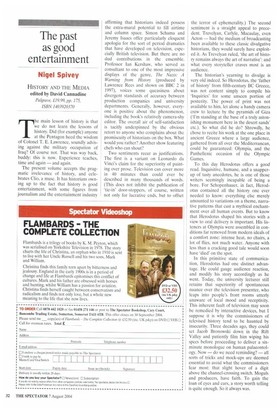The past as good entertainment
Nigel Spivey
HISTORY AND THE MEDIA edited by David Cannadine Palgrave, £19.99, pp. 175, ISBN 1403920370 The main lesson of history is that we do not learn the lessons of history. Did (for example) anyone at the Pentagon heed the wisdom of Colonel T. E. Lawrence, soundly advising against the military occupation of Iraq? Of course not. That was way back, buddy: this is now. Experience teaches, time and again — and again.
The present volume accepts the pragmatic irrelevance of history, and celebrates Clio, a muse. It has historians owning up to the fact that history is good entertainment, with some figures from journalism and the entertainment industry
affirming that historians indeed possess the extra-mural potential to fill airtime and column space. Simon Schama and Jeremy Isaacs offer particularly eloquent apologia for the sort of period dramatics that have developed on television, especially British television. But there are no dud contributions in the ensemble. Professor Ian Kershaw, who served as consultant to one of the most impressive displays of the genre, The Nazis: A Warning from History (produced by Lawrence Rees and shown on BBC 2 in 1997), voices some queasiness about divergent standards of accuracy between production companies and university departments. Generally, however, everyone is positive about the phenomenon, including the book's relatively camera-shy editor. The overall air of self-satisfaction is tacitly underpinned by the obvious retort to anyone who complains about the promiscuity of historians on the box. What would you rather? Another show featuring chefs who can shout?
Two sentiments recur as justifications. The first is a variant on Leonardo da Vinci's claim for the superiority of painting over prose. Television can cover more in 40 minutes than could ever be described in many thousands of words. (This does not inhibit the publication of 'tie-in' door-stoppers, of course, written not only for lucrative ends, but to offset the terror of ephemerality.) The second sentiment is a straight appeal to precedent. Trevelyan, Carlyle, Macaulay, even Acton — had the medium of broadcasting been available to these classic divulgative historians, they would surely have exploited it. As Trevelyan ruled, 'the art of history remains always the art of narrative': and what every storyteller craves most is an audience.
The historian's yearning to divulge is very old indeed. So Herodotus, the 'father of history' from fifth-century BC Greece, was not content simply to compile his 'Inquiries' for some unseen portion of posterity. The power of print was not available to him, let alone a handy camera crew to lecture by the pyramids of Giza (I'm standing at the base of a truly astonishing monument here in the desert sands' etc.). So what did he do? Shrewdly, he chose to recite his work at the one place in ancient Greece where a large audience, gathered from all over the Mediterranean, could be guaranteed: Olympia, and the Panhellenic occasion of the Olympic Games.
To this day Herodotus offers a good read. Inquisitive, humane, and a snapperup of tasty anecdotes, he is one of those writers seemingly incapable of being a bore. For Schopenhauer, in fact, Herodotus contained all the history one ever needed to know: everything else merely amounted to variations on a theme, narrative patterns that cast a mythical enchantment over all human events. But to know that Herodotus shaped his stories with a view to oral delivery is important. His listeners at Olympia were assembled in conditions far removed from modern ideals of a comfort zone: intense heat, no chairs, a lot of flies, not much water. Anyone with less than a cracking good tale would soon have 'died' on the spot.
In this primitive state of communication, Herodotus had one distinct advantage. He could gauge audience reaction, and modify his story accordingly as he went. Today, the university lecturer still retains that superiority of spontaneous nuance over the television presenter, who leaps into people's front rooms utterly unaware of local mood and receptivity. This inherent fault of television may soon be remedied by interactive devices, but I suppose it is why the commissioners of televised history tend to be haunted by insecurity. Three decades ago, they could set Jacob Bronowski down in the Rift Valley and patiently film him wiping his specs before proceeding to deliver a sixminute monologue on human palaeontology. Now — do we need reminding? — all sorts of tricks and mock-ups are deemed essential to avoid what the commissioners fear most: that slight hover of a digit above the channel-crossing switch. Moguls and producers, have faith. To gain the loan of eyes and ears, a story worth telling is quite enough. So it always was.


























































 Previous page
Previous page